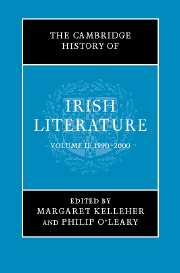Book contents
- Frontmatter
- Introduction
- 1 Literature and politics
- 2 The Irish Renaissance, 1890–1940: poetry in English
- 3 The Irish Renaissance, 1890–1940: prose in English
- 4 The Irish Renaissance, 1890–1940: drama in English
- 5 The Irish Renaissance, 1880–1940: literature in Irish
- 6 Contemporary prose and drama in Irish 1940–2000
- 7 Contemporary poetry in Irish: 1940–2000
- 8 Contemporary poetry in English: 1940–2000
- 9 Contemporary prose in English: 1940–2000
- 10 Contemporary drama in English: 1940–2000
- 11 Cinema and Irish literature
- 12 Literary historiography, 1890–2000
- Afterword: Irish-language literature in the new millennium
- Afterword: Irish literature in English in the new millennium
- Guide to major subject areas
- Index
- References
9 - Contemporary prose in English: 1940–2000
Published online by Cambridge University Press: 28 March 2008
- Frontmatter
- Introduction
- 1 Literature and politics
- 2 The Irish Renaissance, 1890–1940: poetry in English
- 3 The Irish Renaissance, 1890–1940: prose in English
- 4 The Irish Renaissance, 1890–1940: drama in English
- 5 The Irish Renaissance, 1880–1940: literature in Irish
- 6 Contemporary prose and drama in Irish 1940–2000
- 7 Contemporary poetry in Irish: 1940–2000
- 8 Contemporary poetry in English: 1940–2000
- 9 Contemporary prose in English: 1940–2000
- 10 Contemporary drama in English: 1940–2000
- 11 Cinema and Irish literature
- 12 Literary historiography, 1890–2000
- Afterword: Irish-language literature in the new millennium
- Afterword: Irish literature in English in the new millennium
- Guide to major subject areas
- Index
- References
Summary
Introduction
At first glance, the outlook for literary work in the Ireland of 1940 was not propitious. The international situation’s constriction of the English publishing industry, on which most Irish writers depended for a living, together with the constraints placed on domestic literary activity, created an environment that was unpromising, to say the least. In the case of imaginative prose, the prospects appeared to be particularly gloomy, with silence and exile the ostensible order of the day. The departure into exile of Samuel Beckett, in 1939, and Francis Stuart, in 1940, was accompanied by the silence created by Joyce’s death in 1941. And the self-imposed silence and internal exile of Flann O’Brien following the 1941 rejection of his second novel, The Third Policeman (published posthumously in 1967), also made it difficult for the Irish novel to sustain the international reputation it enjoyed in the inter-war period. For Irish novelists the absence of such figures, and of the possibility of a genuinely independent Irish novel their innovative work exemplified, gave rise to problems of continuity and change both conceptually and thematically.
In addition to World War II threatening the loss of audiences outside Ireland, the rigorous enforcement of the Censorship of Publications Act – mainly directed against prose works – ensured that much new writing failed to reach an Irish audience (the 1941 banning of novels by Frank O’Connor (Dutch Interior) and Kate O’Brien (The Land of Spices) are cases in point). Novelistic productivity in the 1940s was generally low, and novelists in the Irish Free State proved reluctant to engage imaginatively with what was known as the Emergency (this was not true of either Northern Ireland novelists or of short-story writers in the Free State).
- Type
- Chapter
- Information
- The Cambridge History of Irish Literature , pp. 421 - 477Publisher: Cambridge University PressPrint publication year: 2006
References
- 3
- Cited by



